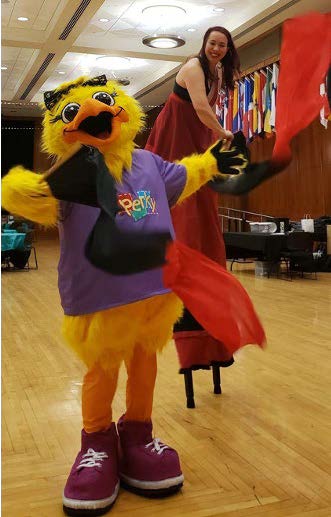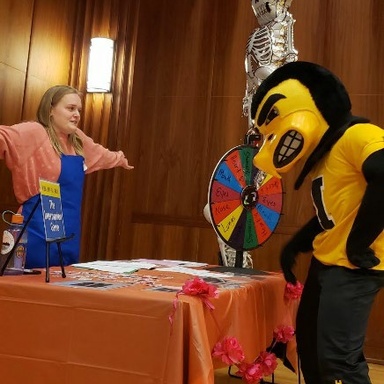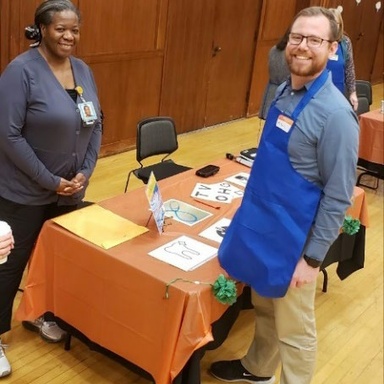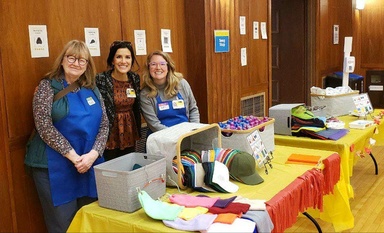Breadcrumb
Health Fun Fair
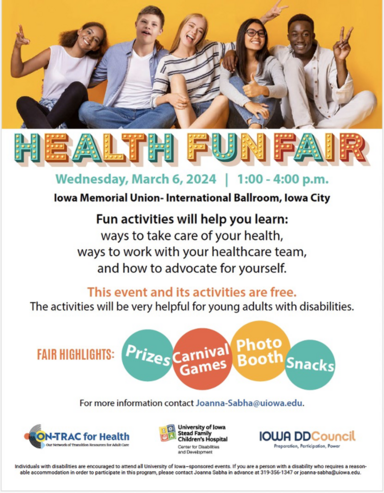
The University of Iowa Center for Excellence in Developmental Disabilities (UCEDD) within the Center for Disabilities and Development (CDD) hosted the Health Fun Fair on March 6th, 2024, to share the mission of advocating for equity in health care. With a focus on recreation and facilitating conversation, the Health Fun Fair fostered an accessible carnival experience to bring fun while having important conversations about health and wellness. The Health Fun Fair aimed to spread awareness of common challenges patients with disabilities may face while receiving health care.
The Health Fun Fair’s primary audience was people in the disability community who were looking for opportunities to learn more about managing and taking control of their health. This event was open to the public, but primarily advertised to people in the disability community. This event also served as an opportunity for socialization and connection with hopes of sparking conversations about health and wellness.
Through the outreach efforts of UCEDD, many different organizations attended including Iowa City High, Iowa City Transition Services, The ARC of Southeast Iowa, The Village Community, and some individuals from the community that did not attend with an organization. There were about 90 participants that expressed interest in this event and just under 50 participants that attended.
Participants were greeted prior to entering the carnival with one of the University of Iowa Center for Disabilities and Development staff. At this table, details were shared about what to expect at the Health Fun Fair’s event as well as pointed out another special feature of the fair: the sensory room. Though the International Ballroom was well equipped with space to be with friends or be alone, it is important to have space to relax away from the crowd. Just down the hall from the main event, participants could find the sensory room. This room was dimly lit by the sunlight from the windows and stocked with fidgets, crafts, drawing supplies, and even a cozy area to take a rest. This calming oasis was staffed by UCEDD staff who were present to provide extra support to anyone who needed it. The carnival was hosted in the International Ballroom at the University of Iowa Memorial Union. There is a large open space allowing participants to have space to mingle and find space for a break from the chatter and excitement of the carnival.
The carnival consisted of six booths with different activities or games. These booths included:
- The 5210 Healthy Lifestyle Game facilitated a conversation about leading a balanced lifestyle. “5210” stands for some examples of important health standards to follow per day. These principles include eating 5 servings of fruit and vegetables per day, 2 hours or less of social media and screen time per day, 1 hour of physical activity, and 0 sugary drinks per day. This game allowed for a discussion about how we can improve our health by following the 5210 guidelines more closely.
- Mental Health Tic Tac Toe created a conversation on ways to improve mental health by discussing good coping mechanisms.
- My Profile Cards allow for people visiting the doctor to have a non-verbal way to advocate for their health needs. Participants had a photo booth area where they got their photo taken where they felt their best. Then, a conversation is held about going to the doctor and what challenges are present for each individual during a doctor visit. Then, their photo and preferred accommodations are listed on their My Profile Card and participants can advocate for themselves in a creative and effective way.
- Match the Medical Tools allowed for a conversation with healthcare professionals about what some of the medical tools are used for to reduce the fear of the intimidating medical language and tools that may be present at a healthcare appointment.
- The Interruption Game focused on learning when and how to speak up when patients do not understand something their doctor is explaining about their health. The participants acted as patients in this game and the “doctor” read a complex diagnosis to the “patient”. Then, participants had to find a verbal or nonverbal cue to indicate to the “doctor” that they need an alternate explanation. Upon interruption, participants would see the positive outcome of the “doctor” explaining things more clearly.
All these activities in the International Ballroom contributed to UCEDD’s main goal of having important conversations about health and wellness on topics that may be a little challenging to discuss. Participants received swag tickets as they participated in the games. As participants finished visiting the booths, they stopped at the “swag station” on the way out where they could cash in their tickets for prizes. The swag table included baseball caps, stocking hats, water bottles, pop-it toys, lip balm, bandages, sunglasses, ear plugs, notebooks and fidget balls. We also used a picture menu to help individuals make choices.
People with disabilities were included in all steps of this event including the planning processes, assisting on the day of the event, and helping to provide critical feedback to improve future UCEDD events. In the planning stages, individuals that work within UCEDD with disabilities were a key part of making this event possible. UI Reach students volunteered to help to make this event possible by working at booths and helping participants find their way around the event. In addition to the help from UI Reach, the event planners worked closely with people with disabilities to understand what accessibility needs are met and what areas need more attention. One focus was on the issue of accessibility in parking near the Iowa Memorial Union. Though there is a parking garage across the street from the IMU, this garage cannot accommodate many accessible vehicles and there are not many accessible spaces available. By discussing with individuals attending who use accessible vehicles, other parking accommodations were made to allow for accessibility to all.
Attendee Feedback
The positive experiences reflected in the faces and conversations seen and heard during the carnival did not go unnoticed. Following the event, UCEDD contacted participants to gain feedback on its perceived success. UCEDD employees visited The ARC of Southeast Iowa’s DayHab program in order to gain feedback from participants and learn about their experience at the Carnival. Upon visiting the ARC, UCEDD workers facilitated conversation with participants to help them feel comfortable and to give them an idea of why we needed their help. Following this, a short four-question survey was conducted to gain data on the success of the event. Participants were asked to respond briefly about their experience to these questions:
- I had fun at the Health Fun Fair.
- I learned something at the Health Fun Fair.
- Would you attend the Health Fun Fair again in the future?
- Did the Health Fun Fair motivate you to make positive changes to your lifestyle?
To ensure success and accessibility of this survey, participants could respond with a “thumbs up” to indicate a positive experience or a ‘yes’, “thumbs down” to indicate a negative experience or a ‘no’, or unsure to indicate that they were indifferent. In agreement with the positive emotions and feedback witnessed at the Health Fun Fair, the responses were overwhelmingly positive. Question 1 received 8 “thumbs up”. Question 2 received 6 “thumbs up”, 2 “thumbs down”, and 2 undecided. Question 3 received “14 thumbs up”, and 1 “thumbs down”. Question 4 received 6 “thumbs up” and 1 “thumbs down”.
In addition to the four binary survey questions, there was open time for participants to share any other thoughts they had related to the fair. From conversation with one individual at ARC, UCEDD employees learned that this person really enjoyed the “swag tickets”. Another participant mentioned that they felt proud of themselves for participating in this event. They felt proud to learn about their health and take action towards being a better self-advocate for themselves. Other participants said they loved being able to get some fresh air and take a trip to a different location that was out of their norm. Several participants said they loved seeing Herky, the University of Iowa’s Hawkeye mascot, and Perky, the Stead Family Children’s Hospital Hawkeye mascot. Participants loved interacting with these characters and said it really enhanced their experience. Participants also mentioned that they loved the food and drink options that were free for attendees. The coordinator of DayHab services for the ARC of Southwest Iowa shared with us that hosting the Fun Fair during a weekday rather than the weekend made this event very accessible for ARC participants. They mentioned how there are so many events she wishes her and DayHab attendees could participate in, but they are outside of regular work hours (The ARC hosts DayHab during weekdays from 1-4) and participants are unable to find transportation. They shared that this was a great event for ARC attendees to learn how to advocate for their healthcare experience and to change their usual schedule.
Pictures from the Health Fun Fair
